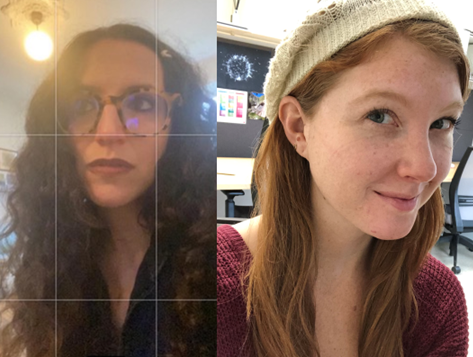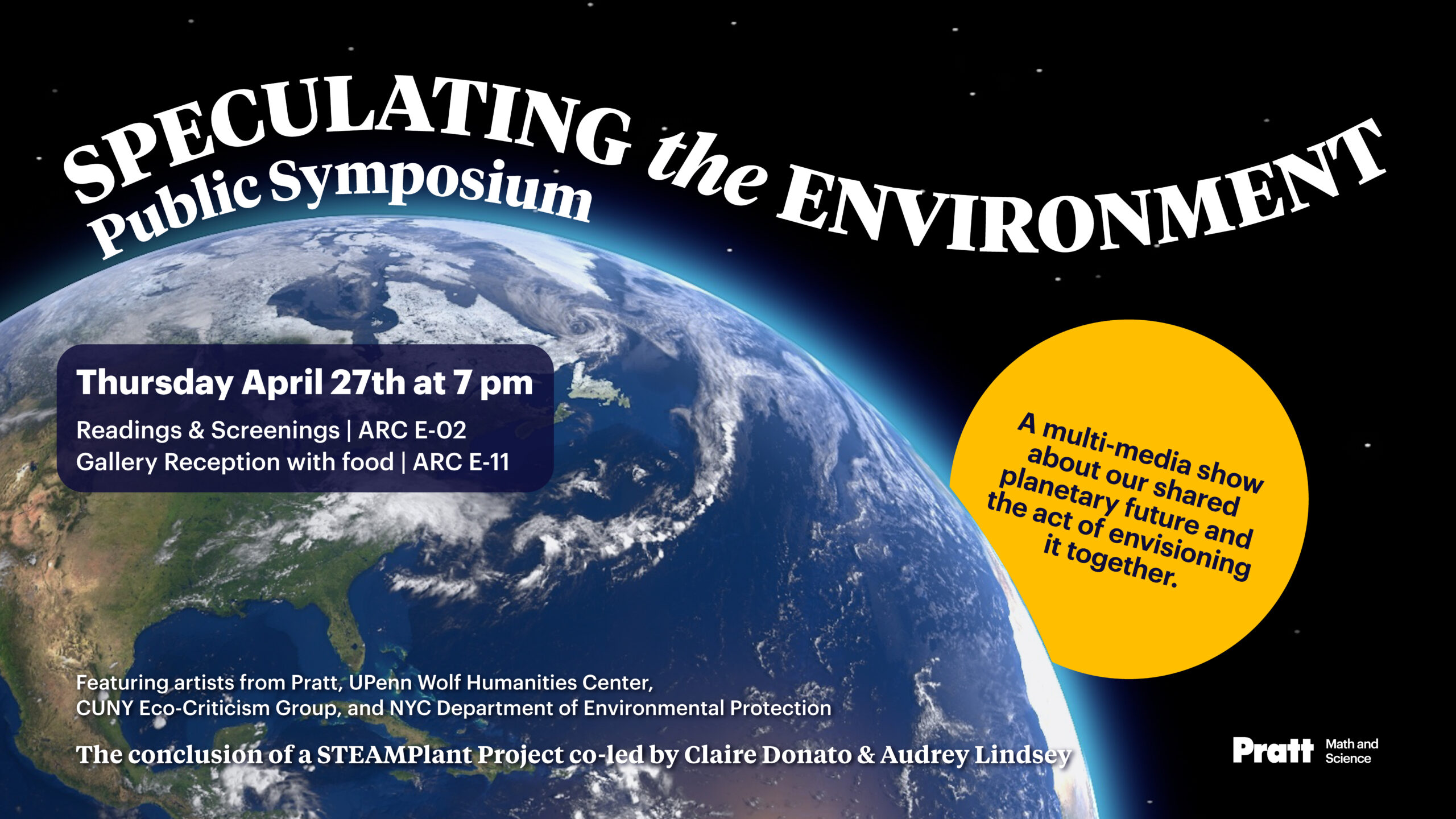Speculating the Environment: An Interview with Claire Donato and Audrey Lindsey
April 26, 2023

The breadth and depth of our environmental crises encourages us to think beyond the bounds of traditional academic disciplines. To me, this is one of the most promising aspects of the environmental humanities as it’s currently taking shape. But, of course, for environment knowledge to transcend and blend disciplinary practices, it must also push beyond the bounds of the arts and humanities. Claire Donatoand Audrey Lindsey are doing just that with their work in the newly formed seminar Speculating the Environment at Pratt Institute in Brooklyn, NY. Claire and Audrey invited me to speak at one of the sessions, and, afterward, I invited them to share more about how the project came about and what they’ve accomplished so far. This interview was conducted by Eric Dean Wilson, writer-in-residence for the Center for the Humanities who focusing on Environmental Humanities.

We had the privilege of meeting when you invited me to participate in a session of your year-long seminar, Speculating the Environment. To start, can you describe what the seminar is, and how it came about? Were you responding to a need you felt in the Pratt Community?
Claire: In Spring 2022, Audrey and I applied for a Pratt Institute STEAMPlant Initiative grant to support Speculating the Environment, which we generously received. Audrey contacted me via a mutual friend to pitch the symposium, and I was immediately excited and all-in. Across my years at Pratt, I’ve taught courses about non-human animals, the ocean, environmental activism, and ecopsychoanalysis—all themes with which my writing practice grapples, and about which I personally think everyday. So, too, for the past decade have I also curated various series, festivals, and events—e.g., Babycastles Gallery’s WordHack, Rutgers University’s Digital Studies Center’s U R Here: A Festival of Digital Language Art, Brown University’s Interrupt IV, and The Brooklyn Rail’s Poetry Reading Series. Speculating the Environment therefore felt like a natural extension of my research, art, and curatorial practices, and an intuitive next step.
Audrey: The seminar series has responded to a need felt at Pratt but also a need felt in the broader scientific community. At Pratt, we have several scientists on the faculty. It’s a small department, but we do have one. Unlike science departments at R1 universities, there is no regular schedule of guest lectures by scientists. So, Speculating the Environment has been a way to fund honoraria to get more scientists on campus sharing their work. On the flip side, the seminars also constructively critique science. The series name positions speculation as an action done to the environment. As an example, sea level rise predictions influence real estate speculation, shaping the built environment. Most scientists I’ve encountered refuse to speculate in acknowledgement of this sort of risk. They stick to high-confidence predictions in all but the most private statements. But is speculating actually any more dangerous than predicting, provided we communicate our level of confidence? Speculation might even be a tool to realize a better environmental future. Our community of artists seeks to develop a practice of environmental speculation in that spirit. Pratt is a special place where this can happen.
I participated in a session in which you invited Claire Valva, a doctoral student in Atmosphere Ocean Science and Mathematics at NYU. That was particularly exciting for me because my book on Freon borrowed so much from the atmospheric sciences, but my training is very much in the humanities. I’m fascinated by scholars who use very different methods and approaches to thinking about planetary forces. I was struck by the visualization Valva brought into the classroom: an animated, colorized map of the planet’s atmospheric rivers. With the participating students, we had a robust conversation about the challenges of visualizing the invisible, of narrating the mundane. Working across disciplinary lines seems particularly crucial when thinking about how the arts might respond most compellingly to environmental issues. I’m reminded of a 1944 lecture “Poetry and Knowledge,” in which Aimé Césaire claimed that “Poetic knowledge is born in the great silence of scientific knowledge.” Can you speak a little about your desire to make this workshop series cross-disciplinary?
Claire: Most straightforwardly, Speculating the Environment is cross-disciplinary in part due to Pratt Institute’s STEAMPlant Initiative, whose mission is “to foster interdisciplinary collaboration between the science, technology, engineering, and mathematics (STEM) fields and ‘art’ as defined by the diverse disciplines pursued at Pratt.”
You’ve had four sessions of the workshop series so far. Have there been any moments that have surprised you or expanded your notions of “speculation” in response to the environment? Any recurring challenges, discussions, or themes that you’ve noticed?
Audrey: When planning this series, I envisioned a practice of speculation about the future. Specifically, climate change was on my mind. Our third workshop, with guests Caroline Juang and Mariel Collard Arias, got me thinking about how we also speculate about the unknown in the present. Even in the present, there are vast unknowns about how the environment is functioning (or dysfunctioning).
On Thursday April 27th at 7pm, you’ll have a public symposium in which the participants will display their works of creative speculation informed by these seminars. Where would you like to see this project go from here? Do you have any plans for similar projects in the future?
Claire: Although our series formally ends with the symposium on April 27th, my hope is our interdisciplinary research cohort will remain in sustained conversation, collaborate on projects, and informally extend the work of Speculating the Environment into the future. It’s been particularly moving to collaborate with colleagues and students from myriad departments at Pratt, including Fine Arts, History of Art and Design, Sculpture, and Information Experience Design. And our collaborations with the CUNY Ecocriticism Group as well as with the University of Pennsylvania’s Wolf Humanities Center have also felt unusual and deeply meaningful. One hope is all of these relationships maintain longevity, and become decentralized from any single academic institution. My gut feeling is that collaborative thinking around environmental speculation and climate crisis actually needs to be decentralized. It would be a dream if a group of artists and researchers in (and beyond!) New York City collaborated on a conference or workshop or series of workshops or future symposium. Wesleyan University’s Animal Studies Program’s pre-COVID programming and fellowship—which brought together independent scholars and thinkers from many disciplines, geographic locations, and schools—comes to mind as one precedent.
Audrey: Here is information about the symposium, which is open to the public and will have free food. And here is a campus map to find ARC on Pratt’s Brooklyn campus.

I’d love to hear a bit about your own work in relation to this series. Has the workshop series influenced your own work?
Audrey: I teach science, and I have started to teach speculation. It is useful for students to see that substantiation is a continuum. Speculation also provides a fertile ground for exploring well-established scientific principles, which you could see in Randall Munroe’s What if? blog and books. The workshop series has helped me develop more rigor and grounding to this pedagogical approach.
Claire: Currently, I’m in the midst of revising my forthcoming fiction book Kind Mirrors, Ugly Ghosts, and the din of climate doom continues to seep in. In particular, I’m thinking of a short story in the book called “David,” wherein a female narrator continuously dreams about distressing environmental change, and ultimately decides not to bear children due to her unconscious revelations. In another story, “The Analyst,” a delusional narrator fantasizes that she and her psychoanalyst share the same zero waste environmentalist values, and that they celebrate those values on a Thelma and Louise-style road trip. And all of the stories in the book explore spiritual respect for non-human animals and anthropomorphism’s complexities—think of a psychoanalytic consulting room located in a turtle’s shell; a hen and her egg rendered via ASCII art; weasels killing chickens; the protagonists of Margaret Wise Brown’s The Runaway Bunny and Arnold Lobel’s Frog and Toad
In the session I participated in, you ended by asking Valva and me what we were reading. I loved this question, and I’d love to ask it to you. Do you have any reading that you’d recommend to someone interested in the environmental humanities or making work about the environment?
Audrey: During that workshop, we discussed how your book After Cooling uses Freon as a device to explore many aspects of society and the environment. Claire mentioned Anna Leahy’s Object Lessons series as an exemplar of this writing and research strategy. A focus on something very small, something known, can be a tether while we peripherally envision the unknown.
In this spirit, Claire got me Fungipedia by Lawrence Millman for my birthday. It is a delightful little book of facts about fungi. I pop it open to a random page for fun and inspiration. As we read about the known—observations, histories—the unknown begins to take shape.
Claire: At Pratt, I teach a poetics elective called The Oceanic Feeling, which combines thinking about the eponymous mystical/psychoanalytic phenomenon with readings about climate crisis and the actual ocean. To this end, I recommend a number of readings from the course: Melody Jue’s Wild Blue Media: Thinking through SeawaterWeathermy students’ gorgeous digital zine, which they collectively designed at the end of the course.
Apart from these course readings, I’m also very excited about Emma Wipperman’s forthcoming book of theater, poetry, and fiction, Joan of Arkansas, “an election-season closet drama about climate catastrophe, divine gender expression, the instructions of angels, and heavenly revelation relayed via viral video.”